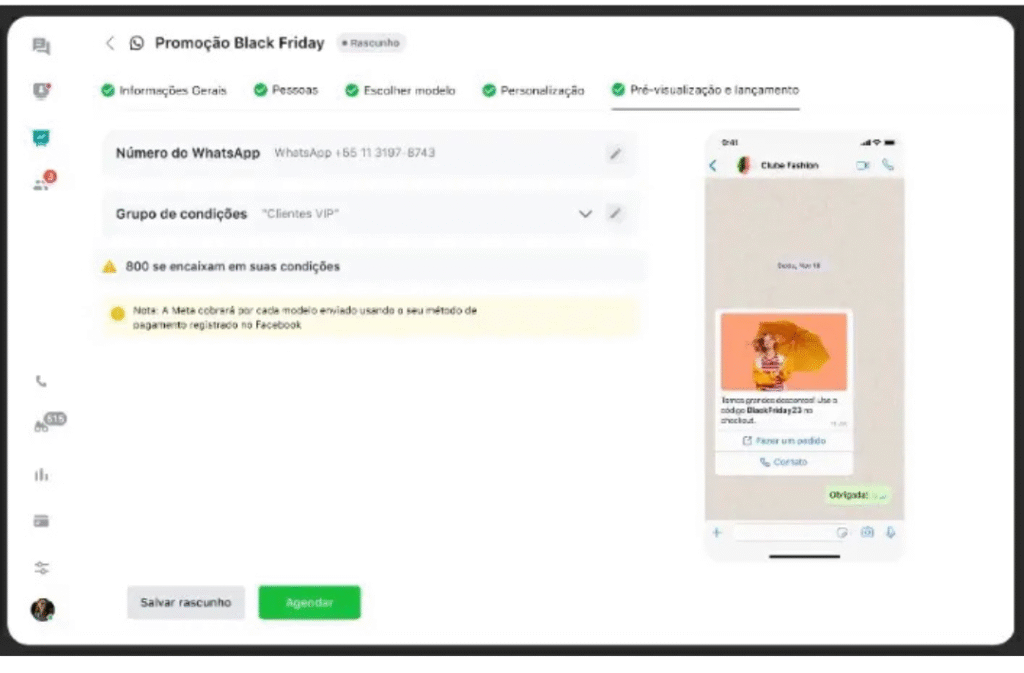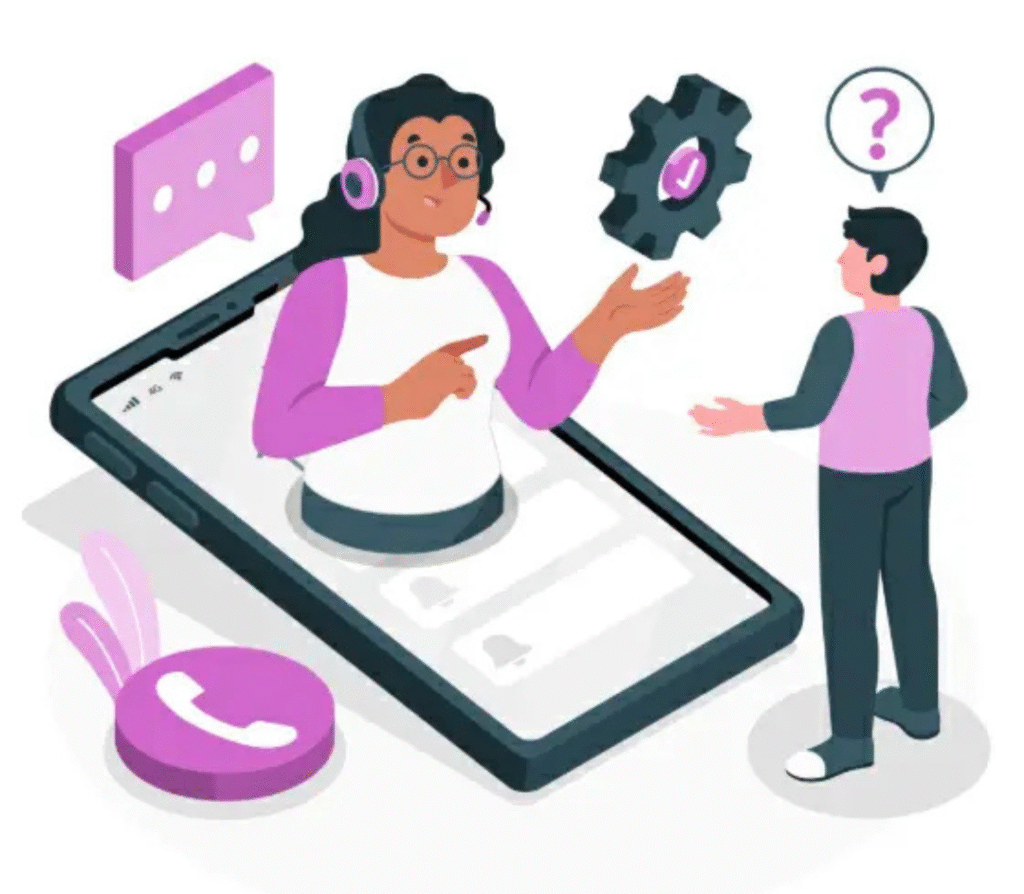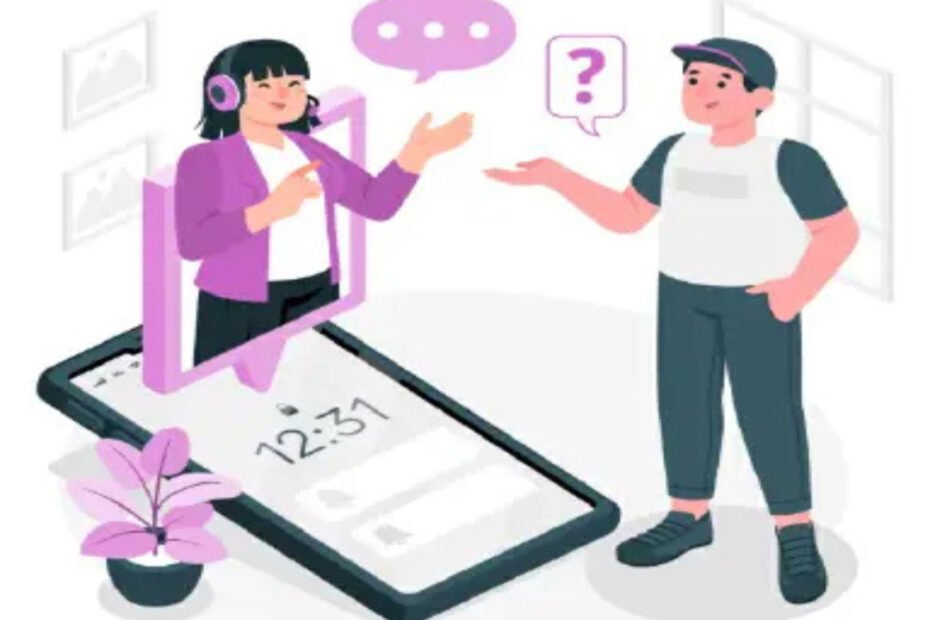Since its launch, WhatsApp for businesses has completely transformed the way we communicate with brands. WhatsApp already has more than 2 billion active users worldwide, according to May 2025 statistics from AiSensy.
In Brazil alone, more than 120 million people use the app both to chat with friends and to interact with brands and companies. As a result, companies began to see the app as an opportunity to create a direct customer service channel.
With the use of companies, WhatsApp created a specific version to serve businesses of all sizes, WhatsApp Business. In addition to the traditional features we already know, it offers extra tools designed specifically to facilitate business routines.
And to serve organizations that receive a large volume of messages daily, the official WhatsApp Business API was developed.
Therefore, we will explain in more detail what the WhatsApp API is, how it differs from traditional versions, and the best WhatsApp tools for businesses. Check it out!
What is WhatsApp for Business?
WhatsApp for businesses is a variation of the app created specifically to facilitate interaction between businesses and their customers. This solution comes in two versions: WhatsApp Business and WhatsApp Business API.
The main difference between them is in their management capabilities: while the former serves small and medium-sized businesses well with basic features, the latter offers more automation and integration features, allowing companies to handle large volumes of messages in a more scalable way.
Key differences between WhatsApp Business and WhatsApp Business API
As we mentioned, WhatsApp Business is more suitable for small businesses, as it facilitates direct contact with customers within the app itself.
In this version, it is possible to schedule automatic messages, such as messages about opening hours. However, management is restricted to a single user, who must manually respond to each message received.
On the other hand, the WhatsApp Business API was developed to serve companies that need to expand and streamline their relationship with the public.
In this model, multiple agents can access the same number simultaneously, in addition to the possibility of integrating chatbots to automate responses and resolve issues quickly and efficiently.
Another important difference is the possibility of using landline numbers, such as traditional 0800 numbers, which helps reinforce the company’s identity and ensures greater credibility for the official customer service channel.
Best WhatsApp tools for businesses
Check out some tools and technological resources that help make communication between companies and customers via WhatsApp more efficient and strategic.
1. JivoChat
We begin our list of WhatsApp for businesses by recommending JivoChat. Developed to integrate sales, support, and customer service in one place. With it, you can chat with customers via your website, WhatsApp, Instagram, and other digital channels, all centralized on a single platform.
With JivoChat’s WhatsApp Business, you can connect your number or the official API directly to the tool’s dashboard, without the need for intermediaries.
This allows you to manage the sending and receiving of messages, set up automatic messages, create targeted campaigns, send promotion notifications, conduct surveys, and provide personalized suggestions.

In addition to gathering all messages in a single inbox, you can also view history, internal comments, and complete customer data within the JivoChat dashboard. The tool also offers detailed reports to monitor team performance.
Furthermore, you can include chatbots to automatically initiate service and filter leads according to profile or need.
Another notable feature is the AI Assistant, which helps with responses, makes grammatical corrections, and adapts the tone of voice to each situation, leaving agents free to focus on more complex issues.
It suggests ready-made responses that can be reviewed before sending and creates summaries of conversations, highlighting important information and frequently asked questions.
2. Sinch
The Sinch WhatsApp Business API is another WhatsApp option for companies that allows them to connect WhatsApp directly to their internal systems, making customer service faster and more efficient.
This tool allows you to schedule automatic multimedia messages, create interactive communications, and use service templates. Another highlight is the Flows feature, which allows you to build guided journeys on WhatsApp with menus, buttons, and personalized calls to action.
Companies can also import lists of contacts who have opted in, organize consent permissions, create targeted campaigns, and track detailed metrics on dashboards, such as delivery rates, views, and average response time.
3. Zendesk
Zendesk Service is a very robust platform dedicated to customer service, which also works very well as a solution for integrating WhatsApp into support.
With automation and chatbot features, it enables continuous support, available 24 hours a day, every day of the week. It is an interesting option for those looking to make service more agile and efficient, as it offers much more than just service via a single channel.
4. Zenvia
Zenvia WhatsApp is an advanced solution that connects companies to WhatsApp Business through an official API, allowing them to implement chatbots, automatic messages, and unified customer service that integrates channels such as websites and Instagram into a single environment.
It is possible to send messages on a large scale, and it is also possible to create interactive flows with buttons, CTAs, and dynamic menus, which facilitate processes such as registrations, appointments, and targeted campaigns.
Attendants can monitor contacts, organize data with labels and notes, and access detailed performance and quality reports in real time. Zenvia has also released new features such as the AI Chatbot Assistant.
5. Kommo
Another WhatsApp option for businesses is Kommo, which allows you to centralize all messages in a single inbox. This makes it easier for your customer service team to manage contacts from different channels.
The platform allows you to register multiple WhatsApp numbers, create links and QR codes to automatically attract new leads, and design message templates with buttons and media, optimizing communication.

What are the advantages of WhatsApp for businesses?
The WhatsApp API is the most advanced version of the app, offering comprehensive features ranging from customer service to direct sales and intelligent automation via chatbots.
1. Real-time customer support
With the API, companies can concentrate all customer service in a single interface, which makes it easier to answer questions, send order updates, resolve complaints, and offer fast and effective support.
2. Scheduling appointments and services
Freelancers and businesses such as beauty salons, workshops, medical and dental offices can integrate the API to allow their customers to schedule appointments without leaving WhatsApp. Appointments are made directly in the conversation, eliminating the need for external redirects.
3. Direct marketing strategies
With the API, companies can integrate CRM with WhatsApp to send targeted campaigns, reaching their target audience with personalized messages that appear directly on the customer’s screen. This way, promotions and offers gain more visibility and have a greater chance of engagement.
4. Automation with chatbots
One of the API’s biggest advantages is the ability to implement chatbots. This feature helps streamline customer service, filter requests, and direct each customer to the appropriate department or representative, making the experience faster and more efficient.
5. Sending notifications and reminders
The API enables companies to keep their customers informed with automatic notifications, such as payment confirmations, delivery status, or appointment reminders, providing convenience and improving communication.
6. Research and feedback collection
In addition, the API can be used to create satisfaction surveys, collect reviews on products or services, and request customer feedback. This helps companies identify improvements, enhance customer service, and continuously evolve their operations.

